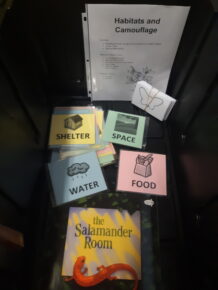NEW! Remote Learning Modules

New for the 20-21 school year - remote learning modules!
Eight modules are available geared toward primary grades through 8th grade. All modules contain materials needed for a class of 30 and can either be disinfected between uses or are disposable. For the 20-21 school year, these 8 modules with accompanying online programming are free of charge. The only thing needed is a class of students (in-person), a teacher in the classroom, and a computer! Please contact Kristen Currier at kcurrier@erieconservation.com for more information.

Your 5 Senses (K-2)
Students will explore their 4 senses (we will skip the sense of taste, although it will be discussed) through 4 different hands-on activities.

Habitats and Camouflage (K-5)
Classes will explore the elements of a healthy habitat and how camouflage aids in animals’ survival.

Tree I.D. (3-8)
Students will explore tree cookies, how to decipher the history of a tree, parts of a tree, and how to utilize dichotomous keys to identify species

Tapwater Tour (3-8)
Students will dabble in a little bit of chemistry to test the school’s tapwater for safety levels. We will also touch on water health and climate change.

Animal Adaptations and I.D. (3-5)
Students will have the opportunity to explore variations in species, how to identify them by their skulls, teeth, and tracks. Students will also have the opportunity to create plaster casts of tracks or track rubbings.

Water Journey (3-5)
Classes will explore the phases and properties of water and how water cycles through our atmosphere.
Macroinvertebrates (3-8)
Students will discover the role of macroinvertebrates in testing the health of natural water. They will also work on identification of species through dichotomous keys.

Vermicomposting (3-5)
Classes will have the opportunity to complete and in-depth study of red wiggler worms in their role as decomposers. We will also complete a discussion and activity of composting/recycling/landfill choices.
